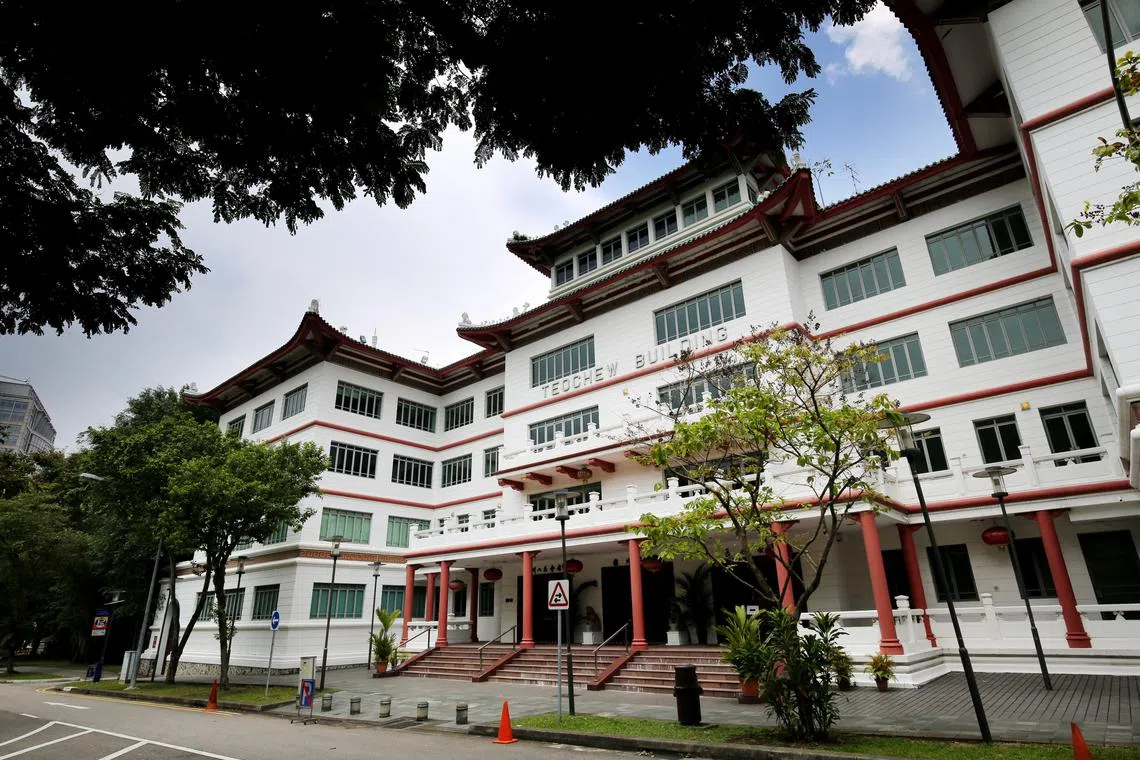Ngee Ann Kongsi is S’pore’s top private donor, Lee Foundation takes No. 2 spot
Sign up now: Get ST's newsletters delivered to your inbox

The Ngee Ann Kongsi claimed top spot in the 2022 Singapore’s 10 biggest philanthropic organisations in terms of donations given.
PHOTO: LIANHE ZAOBAO
SINGAPORE – The Ngee Ann Kongsi has emerged as Singapore’s biggest private donor, giving $37.7 million to a host of charitable causes in 2021.
Founded by a group of Teochew leaders in 1845, the philanthropic group claimed top spot in the 2022 list of Singapore’s 10 biggest philanthropic organisations in terms of donations given.
The Lee Foundation, founded by late rubber tycoon Lee Kong Chian in 1952, took second spot, donating $32.3 million in 2021.
In third place is the Lien Foundation, which gave $23.2 million. Known for its work in early childhood education and end-of-life issues, it was set up in 1980 by the late Lien Ying Chow, founder of Overseas Union Bank.
Soristic Impact Collective, a consultancy, compiled the top 10 list based on publicly available information such as the groups’ latest financial year statements, annual reports and other information listed on the Commissioner of Charities website.
The report, now in its second edition, was released in November. Soristic principal consultant Pauline Tan said the first edition in 2021 focused primarily on foundations.
This year, it decided to shift the focus to private philanthropy to include other grant-makers that are not structured as foundations, but which also give significantly to charity.
It decided to exclude faith-based grant-makers and what it considers to be government-affiliated grant-makers, such as the Temasek Foundation, to focus on private philanthropy.
For its report, it ranked 101 philanthropic organisations, of which the 10 largest groups gave a total of $163 million in grants.
Of the 10, four are the philanthropic arms of companies.
The firms are real estate developer Ho Bee Group, business chamber Singapore Business Federation, supermarket chain FairPrice and real estate giant CapitaLand Group.
The Ho Bee Foundation was ranked sixth, the Singapore Business Federation Foundation seventh, the NTUC FairPrice Foundation ninth and the CapitaLand Hope Foundation 10th.
All four groups made the top 10 list for the first time in the 2022 edition.
Three philanthropic organisations are set up by wealthy individuals or families.
Apart from the Lee and Lien foundations, there is the Shaw Foundation, founded by the late Runme and Run Run Shaw of the Shaw Organisation, taking eighth place.
Two groups are donor-advised funds. The SymAsia Foundation and the Community Foundation of Singapore were ranked fourth and fifth respectively.
Donor-advised funds manage a group of donor funds, advising its donors on the needs in the community and disbursing the money according to their wishes.
The SymAsia Foundation, established by Swiss bank Credit Suisse for its clients, made the top 10 list for the first time with $21.1 million disbursed in 2021, according to the report.
Clients have to pledge to donate at least $1 million to start a foundation at SymAsia Foundation, said its chief executive Dominique Boer. Started in 2010, it has set up – and runs – more than 70 foundations for clients, including individuals and business families from the Asia-Pacific.
The Community Foundation of Singapore was spearheaded by the National Volunteer and Philanthropy Centre.
Mr James Teo Wee Wee, the Ngee Ann Kongsi president, said: “We are grateful and humbled to be recognised as one of Singapore’s top three biggest philanthropic organisations. This is only possible because of the foundation laid by our forefathers that allowed us to continue to generate revenue to contribute to causes in the areas of education, culture and social welfare since the 1930s.”
The Ngee Ann Kongsi gets revenue from commercial ventures such as Ngee Ann City in Orchard Road. The Ngee Ann Kongsi owns the land the shopping and office complex is built on, and its subsidiary, Ngee Ann Development, manages the leasing of space within the complex.
The Ho Bee Foundation has supported causes ranging from the arts to education to social welfare since it was set up in 2010. It gave $10.7 million in 2021.
Self-made billionaire Chua Thian Poh, who founded Ho Bee Group and is the foundation’s chairman, said education helps to promote social mobility.
“That is why it has always been a key priority for us to invest in holistic education where our younger generation can be given the opportunity to make real transformative change in society,” he noted.

Correction note: This article has been edited for clarity.



